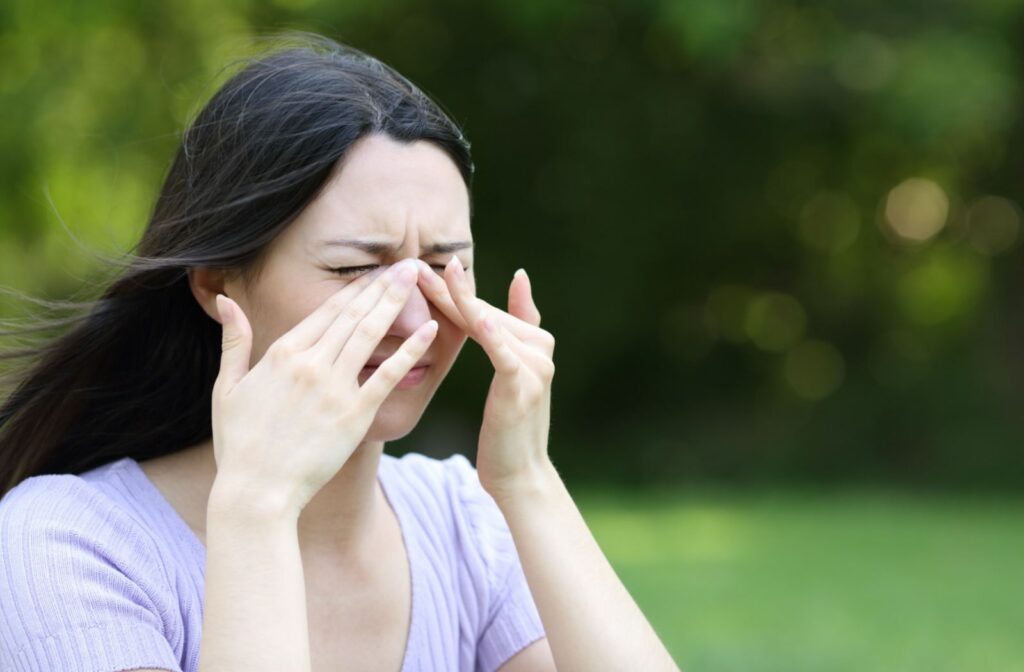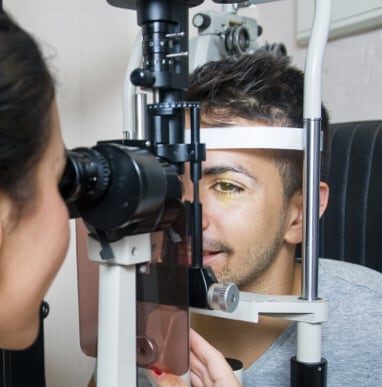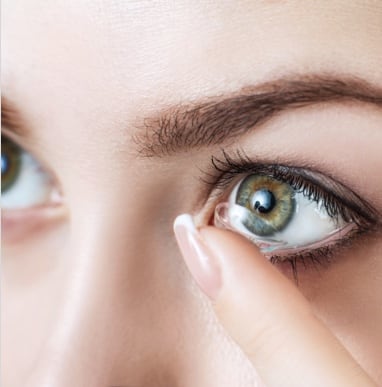As the emerald hues return and flowers bloom, so does a common and irksome issue: dry eyes. With the onset of spring, many find themselves grappling with discomfort—thanks to the very season that’s synonymous with rebirth and fresh starts. But why does spring awaken this eye-related challenge in some of us?
Springtime dry eyes are likely a result of changing weather and more allergens floating around in the air. Anything from differing humidity levels to spending time in air-conditioned spaces can contribute to dry eyes.
Your eye doctor can help determine the cause of your dry eyes and set you on the path to relief.
What Is Dry Eye, Exactly?
Dry eye is a common condition that occurs when your eyes don’t produce enough tears or when the quality of your tears is poor. This can lead to discomfort, irritation, and even vision problems.
There are several factors that can contribute to dry eye, from environmental changes to age, medications, and excessive screen time. Whatever the cause, this is usually related to some disruption in the tear film.
The tear film is like a shield that protects and nourishes the surface of your eyes. It’s made up of three layers: an oily layer, a watery layer, and a mucus layer. Each layer plays a crucial role in keeping your eyes comfortable and healthy. When there’s a disruption to any of these layers, it can lead to dry eyes.

Causes of Dry Eyes in Spring
The tranquility of spring brings with it a few unseen antagonists, from allergens in the environment to changes in temperature and indoor heating or A/C.
Environmental Factors
Pollen and a myriad of allergens are released into the air, triggering allergic reactions for many. These allergens often cause our bodies to reduce tear production as a defensive mechanism, ironically resulting in dry eyes.
Changes in Humidity & Temperature
Spring’s fluctuating weather patterns can wreak havoc on your eyes. With the warmth comes lower humidity, which can evaporate the moisture from our eye surface faster than usual.
Increased Exposure to Air Conditioning
Depending on where you are, the arrival of warmer weather might also mean time to retreat indoors, subjecting ourselves to the drought-inducing blasts of air conditioning. While that cool air can help take the edge of the heat, the artificial climate strips moisture from the air and our eyes alike.
Effects of Dry Eyes
Dry eye can lead to more than just a cursory rub of the eyes. It can foster persistent discomfort, blur your vision, and make your eyes unusually sensitive to light. The irritation can ramp up while you’re enjoying spring’s gifts, from gardening to those long-awaited outdoor adventures.
How to Prevent Dry Eyes
There are a few things you can do to reduce the risk of dry eyes in the springtime.
- Avoiding allergens and irritants might mean keeping windows closed on high-pollen days or investing in a robust air purifier.
- Artificial tears and lubricating eye drops can offer immediate, albeit temporary, relief.
- Keeping your eyes hydrated with a disciplined eye care routine is critical. Ask your eye doctor about hygienic practices and tools you can use in your eye care routine.
Dry Eye Treatments
When preventive measures fall short, professional treatments ranging from intense pulsed light (IPL) therapy to heat therapy and eyelid debridement can step in as reinforcements. On the medicinal front, eye drops prescribed by your doctor or punctal plugs—which block tear drainage—can retain or supplement your eyes’ natural moisture.
Yet, don’t overlook simple lifestyle changes that can significantly impact eye health. Reducing screen time, tweaking your office setup, reassessing medications, considering the type of contact lenses you wear, and refocusing on your diet to include omega-3-rich foods—all these tweaks together can form a mosaic of solutions to combat dry eyes.
Tips for Eye Health in Spring
Besides the treatments and lifestyle modifications, there are quick tips you can apply to your daily life to safeguard your eyes:
- Wearing sunglasses is not just for style—it’s a physical barrier against allergens and UV rays.
- Proper contact lens care minimizes the risk of exacerbating dry eyes, ensuring that your lenses aren’t contributing to moisture loss.
- Lastly, maintain overall eye health with a nutrient-dense diet and regular checkups. Eyes, like any part of the body, thrive with the right nutrients and professional care.
Beat Dry Eyes This Spring
As we further spell into spring, understanding and addressing the root causes of dry eyes can make a significant difference in your daily comfort. Taking the reins of your eye health means you’ll enjoy the best of the season, without the needless irritation.
Taking care of your eyes this spring is akin to tending a garden; it necessitates regular attention, the right tools, and a bit of preventive action. Visit the Vision Care Center team to learn more about dry eye treatments and how to avoid these uncomfortable symptoms this spring. Book an appointment today.












